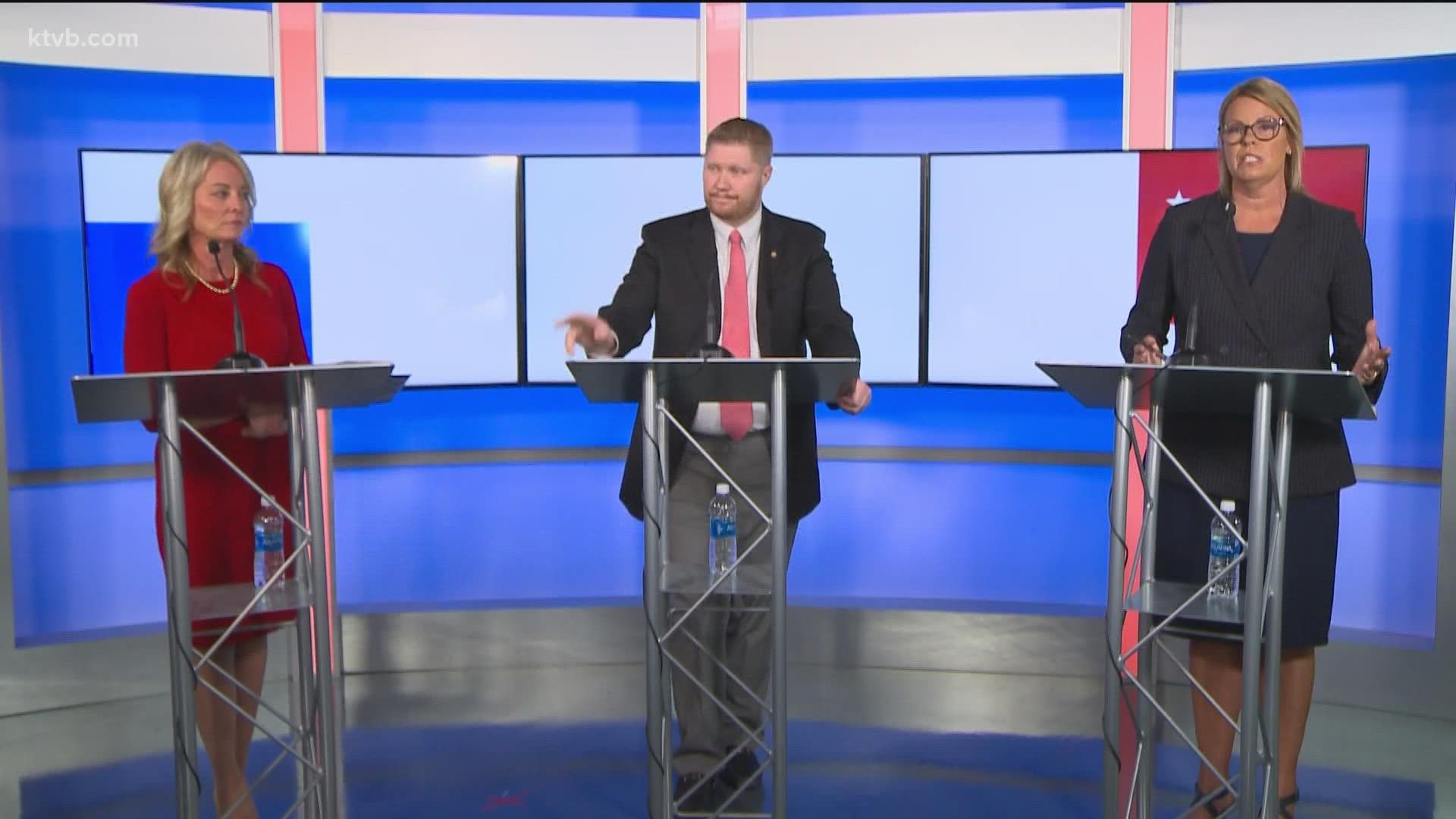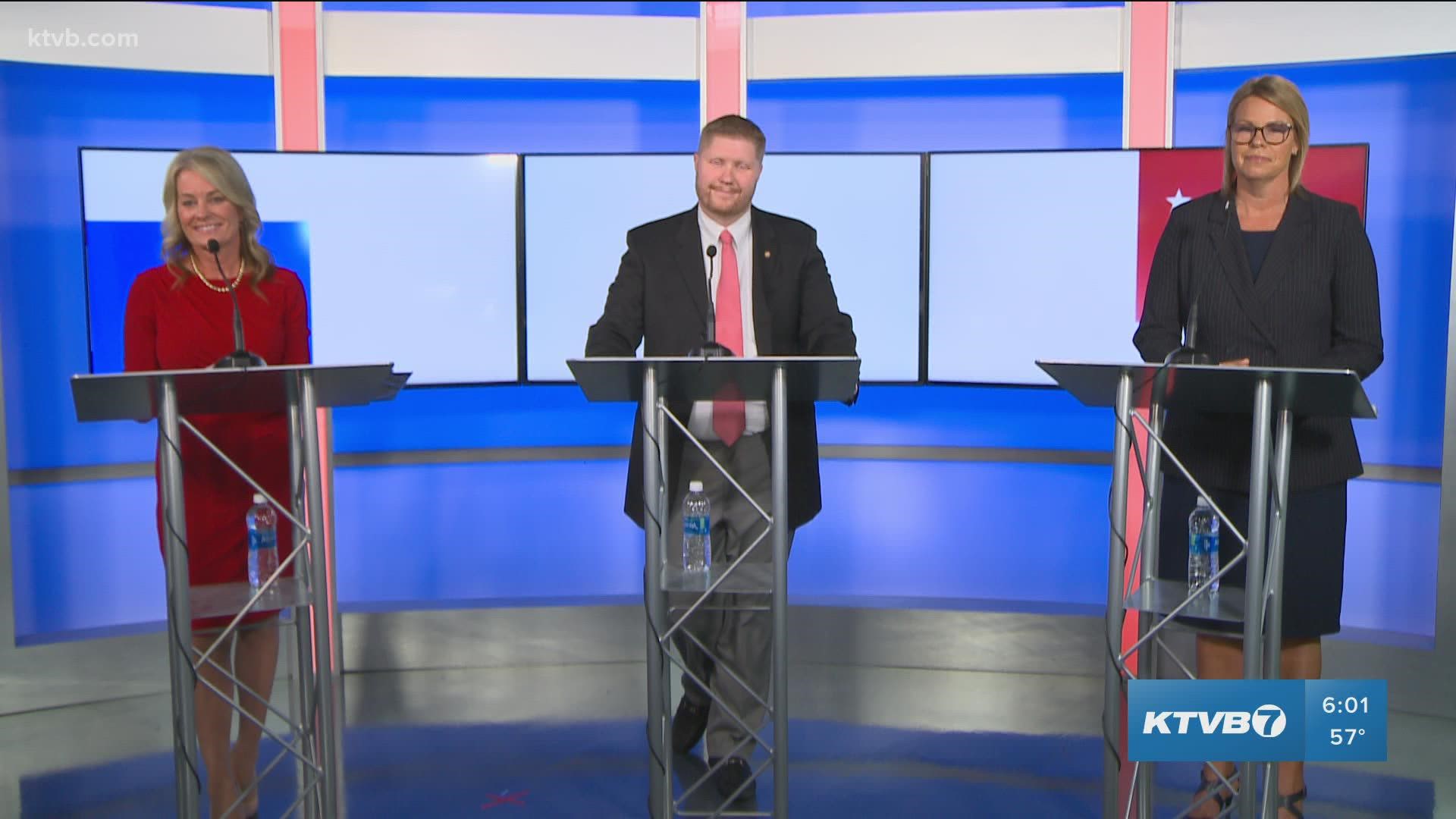BOISE, Idaho —
Idaho Superintendent of Public Instruction candidates Debbie Critchfield, Branden Durst and Sherri Ybarra appeared in a live debate Tuesday evening on KTVB Idaho's Newschannel 7 and KTVB.COM. The three candidates are running for the Republican nomination in the Idaho Primary Election, which is May 17.
Ybarra, from Mountain Home, is the incumbent. She was first elected in 2014, and is seeking a third term. Previously, she worked as a teacher, principal, and federal program director.
"I look back over the last seven years and how our educational system is leading the nation -- leading the nation in the fact that we've gone from 31st in achievement to 17th in achievement; we are fifth in the nation for college- and career-ready, and we are number one in the nation for college credits earned while still in high school," Ybarra said in her opening statement, mentioning "third-party" rankings, including the 2021 Quality Counts report released by Education Week. "We've secured more than $100 million of new money each year since I took office, and I am one of the longest-standing elected superintendents in the nation, and I love my job."
Debbie Critchfield has worked as the public information officer of Cassia County School District, has served on the Idaho State Board of Education and was the co-chair of Gov. Brad Little’s Education Task Force. She was also an elected trustee on the Cassia County School Board.
"I believe Idaho needs a strong educational leader that will set the vision for the needs of the 21st-century classroom and student. I'm running because our kids matter, parents matter, and our teachers matter -- and great schools matter to Idaho," Critchfield said in her opening statement. She went on to say that the core of her vision rests on skills and work readiness, starting with a strong foundation of reading.
Branden Durst’s professional background includes a mediator for Plumblined Services, a managing partner of Rational Strategy Consulting, and an adjunct professor at College of Western Idaho. Durst also previously served in the Idaho House of Representatives and Senate.
In his opening statement, Durst described himself as a "Christian, husband, father to five, and I am the conservative for state superintendent." Later in the debate, Durst said he supports state education money "following parents," whether that's for public or private school.
KTVB anchor Doug Petcash moderated the debate, which included questions submitted by KTVB viewers and presented by the panelists: KTVB's Joe Parris and Morgan Romero, and Idaho Public Television reporter Logan Finney.
The entire debate is in the video above and through this link. Here is how each candidate addressed questions about some key issues:
What is your view of public education in the state of Idaho, and what do you think government's role is in that? Article IX, Section 1 of the Idaho Constitution states: "The stability of a republican form of government depending mainly upon the intelligence of the people, it shall be the duty of the legislature of Idaho, to establish and maintain a general, uniform and thorough system of public, free common schools.
Ybarra: "We have a great educational system in the state of Idaho... I believe the things that we need to work on moving forward and I know -- as the only classroom teacher on this stage who's run a building as a principal, who's been a classroom teacher teaching kids to read -- are the things that are going to matter moving forward to Idahoans. We need to close the achievement gaps. We need to work on our funding formula. We need to talk about the aging schools that are across our state. And we need more parental involvement. We're going to continue to work on reading achievement in our state, we're going to work on parental involvement. I'm going to work on raising the profession and teachers' salaries, exactly as I have coming into this position..."
Durst: "We have to have someone who understands and believes in the Idaho Constitution leading our schools. So many things are happening in our schools today, whether it be the sexualization of our schools, critical race theory and other social justice indoctrination, that are keeping us from meeting that constitutional mandate. So I am proposing a series of ways to make sure that we can eradicate those things to protect our schools so that we can meet that constitutional imperative."
Critchfield: "I believe that COVID created an opportunity for us. It did not create the issues that our parents, our communities and our teachers feel, but it really highlighted and intensified some of those feelings, and we've got the opportunity to create and transform the system that we've got. I'm not here to tell you that our teachers are doing a poor job or that our communities are all over the place frustrated, but I am here to... bring out that we need a leader and we need a vision. This is where the government's part is: You need to be responsible to the taxpayer, and what's the return on that investment? I'm looking for someone that can be an advocate, that's a different set of qualities beyond a school teacher, and we're looking for someone that can create and transform the system that we need -- bring forward the things that are working well, and change those that we need some work on."
Critical race theory. Each candidate was asked if he or she believed or had evidence that CRT was being taught in Idaho schools.
Durst, several times during the debate, mentioned critical race theory and "social justice indoctrination." He said it is being taught in some schools around Idaho, "some places more insidiously than others, but it is happening, and we must stop it once and for all."
Critchfield: "I've seen no evidence of a systemic effort to have it in our schools... I've talked to a lot of people who have no idea what it is. They've heard the acronym, and some people aren't even sure what the acronym spells out. For those folks, they're wondering, 'what's going on?' If we can use that to draw more attention to what is being taught in the classroom and engage our parents, that's a good thing. To scare people is not a good thing."
Ybarra: "I do not support CRT. As the mother of an interracial child, Idahoans find that offensive, and so do I. It's ridiculous, but parents are concerned, and what I would say to a parent tonight: We're not one of those scary examples in the Hillsdale College Journal Report, but I will be the superintendent on your behalf who travels the state, continues to investigate allegations of CRT, and I have yet to see it as your state superintendent."
Do you like the new Idaho Content Standards, or do you believe there should be further change?
Critchfield: "I believe this is an opportunity to look at what those reviews and what those changes will bring about, and if they're not satisfactory, we need to talk about a change, a wholesale change."
Durst: "We did change a few of the standards, and that's a step in the right direction. I've been advocating for the end of Common Core since it started, and I believe we need to do that, but we haven't gotten there yet. We'll still have SBAC testing, which is high-stakes testing that you take at the beginning of the year and the end of the year. It doesn't work for students, it doesn't work for teachers, yet we'll still have that."
Ybarra: "My opponents are showing you what they don't know," Ybarra said, just before Durst interrupted her. Durst later accused Ybarra of lying when she said the state got rid of Common Core on her watch. When given an opportunity to respond to Durst's accusation, Ybarra said, "It's ludicrous. He wasn't there while all the educators and stakeholders across the state worked diligently for two years on the standards, trying to please the people of Idaho. I think it's a terrible disservice to all of those people who volunteered to rewrite the standards."
Where do you draw the line on local vs. state control?
Ybarra: Called herself as a "staunch supporter" of local control, and promised to continue working with local school districts and support Idaho's students and parents. "That is why you have never seen me mandate masks or close schools across the state of Idaho," she said. "That is also why you saw my in-person learning bill get through the Legislature, because when schools closed, we knew as educators that was not working, I did not like what I saw, so that was the time to step in. That was a fine example of 'time to get these buildings open, Madam Superintendent, make sure our kids are back in the classroom,' and in-person learning is the first choice for parents and students in Idaho."
Durst: "When we saw last fall families being forced to mask their children over their own objections, that was a case when we should have gone ultra-local: back to the parents," he said, adding that the State Board of Education should have stepped in and enacted a prohibition on mask mandates in Idaho schools... "As it relates to critical race theory and social justice indoctrination, this again is a constitutional issue. The constitution requires that we have a republican form of government, and those things are antithetical to that goal, and so I believe that the superintendent and the State Board of Education work together to protect our constitution, and if that means we need to pass policies to prevent those things from happening in our schools, so be it..."
Critchfield: "Being an advocate for local control and supporting that does not mean leaving school districts to themselves. That is what I've consistently heard over the last two years and goes back to a statement that Mr. Durst made -- as president of the (state) board, I was equally frustrated with the inability and the lack of support, the lack of service that was happening in the K-12 arena. As an appointed volunteer, I was not able to address that. That's why I'm seeking a different position at the same table. There's a statutory line of what is available for local boards. The superintendent is a partner, is a supporter, and the state department of education needs to serve as a service center."
The winner of the Republican primary will face Democratic candidate Terry L. Gilbert in the general election in November. Gilbert is unopposed in the Democratic primary, and did not appear in Tuesday's debate.
In addition to being televised and streamed live on KTVB, a recording of the debate is available on the KTVB YouTube channel.
Watch more Idaho politics:
See all of our latest political coverage in our YouTube playlist:


